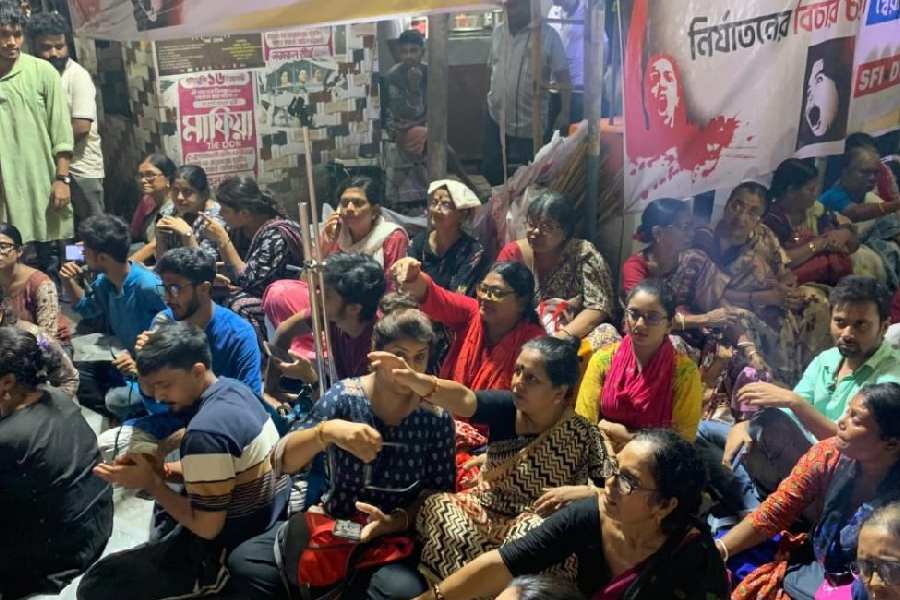The CPM on Wednesday presented conviction statistics in rape cases in Bengal, alleging that “The Aparajita Women and Child (West Bengal Criminal Laws Amendment) Bill, 2024” brought in the aftermath of the rape and murder of the RG Kar doctor was an attempt to hide the state government’s lack of will in cracking down on such criminality.
Armed with a series of slides titled “West Bengal police and administration is afflicted with a serious disease, it needs surgery not home remedies”, CPM state secretary Md Salim said: “The drama of enacting a law will not work.”
“If there is an intention to correct the system, then they (the state government) should present a multipronged effort that should have the involvement of experts, professionals and people at large.... When we need political will to punish the culprits, they are talking of a legislative bill,” Salim continued.
The CPM leader said the Mamata Banerjee government was trying to give the impression that the new law would help in the RG Kar case but reminded that “laws are prospective”.
“It will have no impact in delivering justice in the RG Kar case,” Salim said.
Reeling off statistics sourced from the Union law ministry, Salim argued that the Mamata Banerjee government had “little intention in dealing with rape cases and lack of conviction was related to poor investigation”.
One of the slides that Salim presented at the news meet showed how registration of rape cases and conviction dropped significantly between 2010-22.
The figures, which were tabled in response to a question in the Lok Sabha on February 9 this year, state that in 2010 the number of rape cases registered under Section 376 of the Indian Penal Code was 2,311. In 2011, when Mamata Banerjee ended the 34-year rule of the Left Front, the number rose marginally to 2,363, but began to fall
consistently since 2012. From 2,311 in 2011, the number of cases registered fell to 1,111
in 2022.
Similarly, conviction figures fell during the 2010-22 period, Salim said. In 2010, the number of persons convicted was 128 but since then it began to drop with an exception in 2013 with 181 convictions. Thereon, figures continued to drop with a lowest of 14 convictions in 2020. In the next two years, the conviction figures were 22 and 33.
Salim said the poor rate of conviction in Bengal under Mamata was exposed when compared to the all-India figure during 2010-22.
Reading from the slide, Salim said: “In 2010 the all-India percentage of conviction in rape cases was 26.6, whereas the corresponding figure for Bengal was 13.7. But in 2022, while the all-India conviction rate was 27.4 per cent, Bengal’s rate was 5.8 per cent. It’s a huge gap from the all-India rate.”
However, 2022 was not the worst in terms of conviction. In 2020, Bengal’s rate was a mere 3.1 per cent while the national figure was 39.3, the highest during 2010-22.
Citing the “lack of will” of the Mamata government to deal with rape cases, Salim said for the period between 2020 and 2022, Bengal ranked 32nd among 36 states and Union Territories when it came to the rate of convictons of those arrested. In those three years, Bengal’s rate of conviction of persons arrested was 1.3 per cent, 2 per cent and 2.8 per cent, respectively, when Mizoram led the list with figures of 30.6 per cent, 20.7 per cent and 50 per cent, respectively.
“Statistics show that in terms of (absolute number of) cases of all types of crime against women, Bengal was placed fourth with Uttar Pradesh, Maharashtra and Rajasthan taking the first three ranks,” Salim said.
Apart from coming up with statistics to argue the government’s lack of political will, the CPM politburo member charged the state with involving a law firm to draw up the anti-rape law that was passed with the support of the BJP in the Assembly on Tuesday.
Referring to the Justice J.S. Verma Committee formed in 2013 to review criminal law in the aftermath of the Nirbhaya gang-rape in Delhi in 2012, Salim said if the government’s intent had been transparent they should have formed a similar panel and held a wide range of consultations before framing the law.
The slides he presented also said that in 2022, among the 10 states that recorded the highest number of rape cases, five were BJP-ruled.










